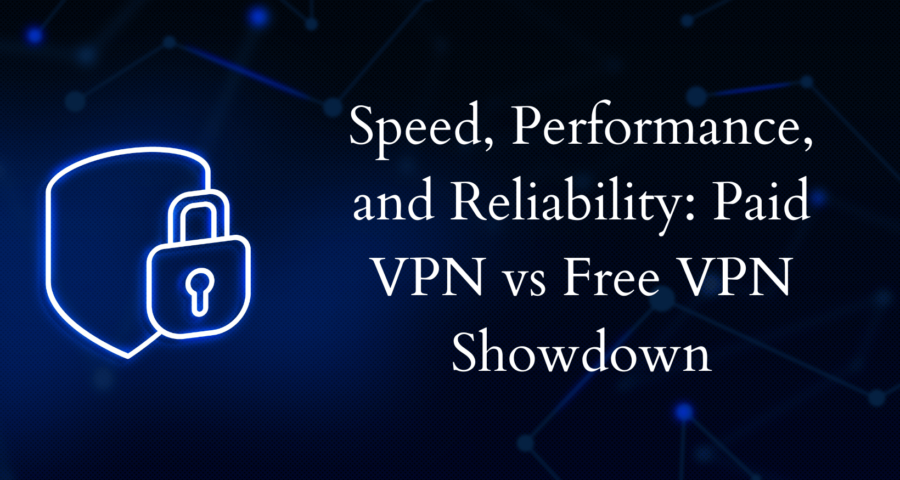In today’s digital age, internet users are more concerned than ever about their online privacy and security. This concern has given rise to the increasing popularity of Virtual Private Networks (VPNs), which promise to safeguard your online activities. However, not all VPNs are created equal. In this blog post, we will delve into a crucial aspect of VPNs: speed, performance, and reliability. We’ll discuss paid VPN vs free VPN in these aspects to help you make an informed choice for your online protection.
Paid VPNs: Pros and Cons
Pros
High-speed connections: Paid VPNs offer blazing-fast internet speeds, ensuring that your online activities are smooth and uninterrupted.
Reliable server infrastructure: They invest in dedicated servers and maintain a robust network infrastructure, reducing the chances of server overloads and slowdowns.
Enhanced security features: Paid VPNs provide strong encryption, follow a strict no-logs policy, and support additional security protocols, making them highly secure.
Customer support: With 24/7 assistance and troubleshooting, paid VPNs offer immediate help when you encounter issues.
Cons
Cost: The primary drawback of paid VPNs is the cost involved. They come with various pricing tiers, which may not fit everyone’s budget.
Limited free trials: While some paid VPNs offer free trials, they are often time-limited and may not provide a comprehensive experience.
Not completely free: Paid VPNs, by definition, require payment, which might not be suitable for users seeking entirely free solutions.
Free VPNs: Pros and Cons
Pros
No cost involved: Free VPNs are attractive for budget-conscious users who want to protect their privacy without spending a dime.
Availability: There is an abundance of free VPN providers available, making it easy to find one.
Anonymity: Free VPNs allow you to maintain online privacy and keep your online activities hidden.
Cons
Slower speeds: Free VPNs are often plagued by overloaded servers and limited bandwidth, leading to slower internet connections.
Security risks: Some free VPNs engage in data logging, rely on ad-supported models, or have questionable privacy policies, potentially compromising your data.
Unreliable performance: Frequent connection drops and server downtime are common issues with free VPNs, impacting your online experience.
Limited server locations: Free VPNs usually offer fewer server options for global access, limiting your ability to bypass geo-restrictions.
Speed and Performance Comparison
Testing Methodology
To provide an accurate comparison, we conducted extensive speed and performance tests on both paid and free VPNs. Our methodology involved measuring download/upload speeds and assessing real-world user experiences.
Results: paid VPN vs free VPN
Paid VPN speed and performance
Our tests showed that paid VPNs consistently delivered impressive speed and performance. Users reported low latency and fast download/upload speeds, making them ideal for bandwidth-intensive activities like streaming and gaming.
Free VPN speed and performance
Conversely, free VPNs struggled to maintain high speeds. Overloaded servers and limited bandwidth hindered their performance. Users often experienced frustrating lags and buffering during their online activities.
Analysis
The implications of these test results are clear. If you prioritize speed and performance, a paid VPN is the superior choice. It ensures a seamless online experience with minimal disruptions, making it worth the investment.
Reliability and Uptime Comparison
Uptime Statistics
Paid VPNs consistently outperformed free VPNs in terms of uptime. They maintained higher availability, ensuring that users could connect to their servers reliably.
Reliability in Maintaining Connections
Users of paid VPNs reported fewer connection drops and server downtime, further highlighting their reliability. Free VPNs, on the other hand, often failed to provide a stable connection.
Impact on Online Activities
The reliability of your VPN can significantly affect your online activities. Paid VPNs offer uninterrupted streaming, smooth gaming experiences, and reliable access to geo-restricted content. Free VPNs, with their intermittent performance, may not provide the same level of reliability.
Conclusion: paid VPN vs free VPN
In the paid VPN vs free VPN showdown, the choice ultimately depends on your priorities and budget. If speed, performance, and reliability are crucial to you, a paid VPN is the way to go. While they come with a cost, the enhanced security and seamless online experience they offer are well worth it.
However, if budget constraints are your primary concern, a free VPN can still provide some level of privacy protection. Just be prepared for potential speed and reliability issues.
Remember that regardless of your choice, maintaining online privacy and security should be a top priority. VPNs are valuable tools in achieving this, and the decision between paid and free options should align with your specific needs.


Leave a Reply